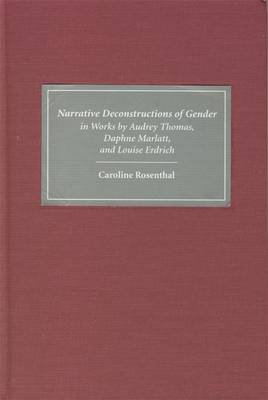
Bedankt voor het vertrouwen het afgelopen jaar! Om jou te bedanken bieden we GRATIS verzending (in België) aan op alles gedurende de hele maand januari.
- Afhalen na 1 uur in een winkel met voorraad
- In januari gratis thuislevering in België
- Ruim aanbod met 7 miljoen producten
Bedankt voor het vertrouwen het afgelopen jaar! Om jou te bedanken bieden we GRATIS verzending (in België) aan op alles gedurende de hele maand januari.
- Afhalen na 1 uur in een winkel met voorraad
- In januari gratis thuislevering in België
- Ruim aanbod met 7 miljoen producten
Zoeken
Narrative Deconstructions of Gender in Works by Audrey Thomas, Daphne Marlatt, and Louise Erdrich
Caroline Rosenthal
€ 177,45
+ 354 punten
Omschrijving
By analyzing the works of Thomas, Marlatt, and Erdrich through the lenses of subjectivity, gender studies, and narratology, Caroline Rosenthal brings to light new perspectives on their writings. Although all three authors write metafictions that challenge literary realism and dominant views of gender, the forms of their counter-narratives vary. In her novel Intertidal Life, Thomas traces the disintegration of an identity through narrative devices that unearth ruptures and contradictions in stories of gender. In contrast, Marlatt, in Ana Historic, challenges the regulatory fiction of heterosexuality. She offers her protagonist a way out into a new order that breaks with the law of the father, creating a "monstrous" text that explores the possibilities of a lesbian identity. In her tetralogy of novels made up of Love Medicine, Tracks, The Beet Queen, and The Bingo Palace, Erdrich resists definite readings of femininity altogether. By drawing on trickster narratives, she creates an open system of gendered identities that is dynamic and unfinalizable, positing the most fragmented worldview as the most enduring. By applying gender and narrative theory to nuanced analysis of the texts, Rosenthal's study elucidates the correlation between gender identity formation and narrative. CAROLINE ROSENTHAL is assistant professor of American Studies at the University of Constance, Germany.
Specificaties
Betrokkenen
- Auteur(s):
- Uitgeverij:
Inhoud
- Aantal bladzijden:
- 202
- Taal:
- Engels
- Reeks:
- Reeksnummer:
- nr. 10
Eigenschappen
- Productcode (EAN):
- 9781571132673
- Verschijningsdatum:
- 21/05/2003
- Uitvoering:
- Hardcover
- Formaat:
- Genaaid
- Afmetingen:
- 159 mm x 240 mm
- Gewicht:
- 444 g

Alleen bij Standaard Boekhandel
+ 354 punten op je klantenkaart van Standaard Boekhandel
Beoordelingen
We publiceren alleen reviews die voldoen aan de voorwaarden voor reviews. Bekijk onze voorwaarden voor reviews.









